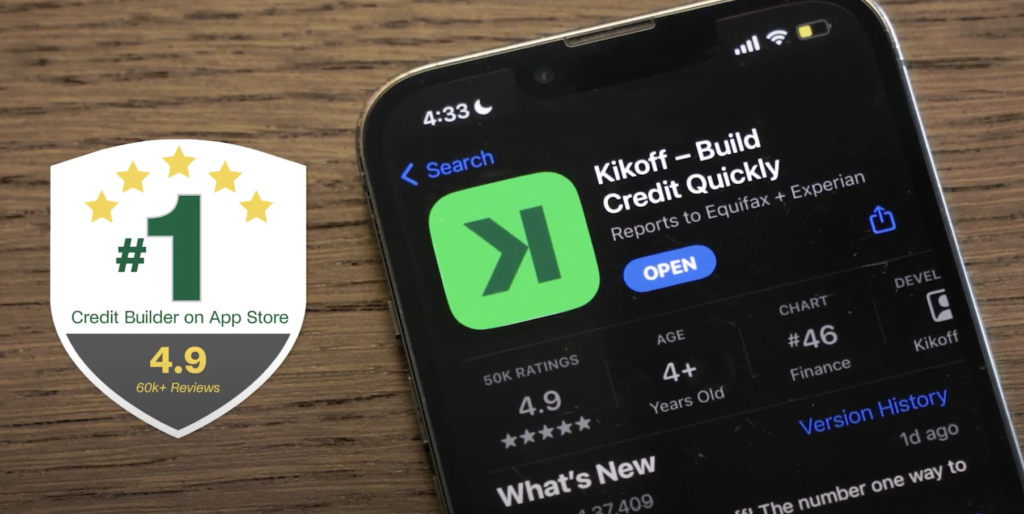Building credit (or rebuilding it) can be tough. Especially if some of your biggest monthly payments, like rent, don’t even count. But what if it did?
Every month, millions of renters pay their landlords on time. Yet most of those payments don't show up anywhere on their credit reports. That means no credit score boost, no reward for responsibility, and no progress toward major financial goals.
Good news: That's changing.
Thanks to rent reporting services like the one offered by Kikoff, your rent payments can now count toward building your credit.
However, you may be wondering about things like how rent reporting works and why it matters. You also might be curious who rent reporting benefits the most, and how you can get started.
For these answers and more, just keep reading.
Why Rent Doesn't Automatically Help Your Credit
Does paying rent build credit?
Many people are surprised to learn that rent payments don’t automatically appear on their credit reports. Most landlords don't report rent to the credit bureaus, and without that, your consistent payments go unnoticed.
Understanding why this happens is the first step to making sure your rent works for your credit score.
Here's why rent doesn’t usually affect your credit score:
- Most landlords don't report rent to the credit bureaus.
- The major credit bureaus (Experian, Equifax, and TransUnion) only include rent data if it's submitted through specific channels.
- You typically need a third-party service to bridge the gap between your rent payments and the bureaus.
So, even if you’ve paid on time for years, it likely hasn't helped your credit score… unless you've taken some extra steps.
What Is Rent Reporting?
Rent reporting is when your monthly rent payments are reported to one or more of the major credit bureaus. Once reported, rent payments appear on your credit report, similar to a loan or credit card account.
This data helps build your credit history, especially your payment history, which makes up about 35% of your FICO score.
How does rent reporting work?
- A rent reporting service verifies your monthly payments.
- The service sends that data to credit bureaus.
- On-time payments are recorded as positive tradelines.
Can Rent Reporting Boost My Credit Score?
Rent reporting can be a valuable tool for building credit. When your rent is reported, it becomes part of your official credit history. That can be especially powerful if you're just starting out or working to repair a damaged score.
Rent reporting helps in a few key ways:
- It establishes a credit history if you're starting from scratch.
- It adds to your payment history, the most important credit score factor.
- It diversifies your credit mix, which can positively influence your score.
Many users report credit score increases within a few months of reporting their rent. It's not a magic solution, but it's a smart one, especially if you’re already making on-time rent payments.
With vs. Without Rent Reporting
FeatureUsing Rent ReportingNot Using Rent ReportingTradeline AddedYesNoCredit Score ImpactPositiveNeutralCredit History LengthLongerShorterCredit Approval LikelihoodHigherLower
Who Benefits the Most from Reporting Rent?
Anyone who pays rent can benefit from rent reporting, but certain people may see even bigger gains. If you're looking for a simple, low-risk way to improve your credit, this is one of the easiest options available.
Rent reporting can help if you:
- Have no credit or a thin credit file.
- Are recovering from past credit mistakes.
- Want to improve your credit without taking on new debt.
- Need to show a history of reliable payments to landlords or lenders.
For people trying to build or rebuild their credit, rent reporting is a tool that can be a game changer.
How to Start Reporting Your Rent
How do you report rent to your credit history?
You don't need to be a financial expert to start building credit with rent. With the right service, the setup process is simple and straightforward.
Here's a step-by-step overview:
- Check with your landlord. Some landlords already use rent reporting platforms.
- Choose a rent reporting service. Services like Kikoff, Boom, or LevelCredit help renters report payments.
- Link your payment method. Most services verify rent via your bank account.
- Submit your lease. You’ll usually need to upload your lease or rental agreement.
- Start building credit. Once verified, your payments get reported monthly.
Many services like Kikoff can provide an instant credit history boost.
Common Myths About Rent Reporting
There are plenty of myths about rent reporting. Let's set the record straight so you can make smart, confident decisions about your credit-building strategy.
Myth 1: Paying rent always helps your credit.
- Truth: Rent payments only help your credit if those payments are reported to the bureaus.
Myth 2: Rent reporting is only for people with bad credit.
- Truth: It benefits anyone who wants to strengthen their credit profile.
Myth 3: One late rent payment will ruin your score.
- Truth: Most services only report positive payment history.
Myth 4: All rent reporting services are the same.
- Truth: Rent reporting services vary in cost, bureaus reported to, and features.
What to Look for in a Rent Reporting Service
What’s the best rent reporting service?
Choosing the right rent reporting service can make a big difference in how it impacts your credit report. Look for a service that aligns with your goals, budget, and living situation.
Some key features you want to make sure you consider include:
- Which credit bureaus they report to: Some only report to one or two.
- Cost: Fees vary widely; some services are free, others charge monthly.
- Ability to report past payments: Look for services offering 12-24 months of back reporting.
- Positive-only reporting: Choose services that don’t report missed or late payments.
- Ease of setup: Look for user-friendly apps and websites.
What to Look for in a Rent Reporting Service
FeatureHow It HelpsCredit Bureau CoverageReports to Equifax, Experian, and/or TransUnionPositive-Only ReportingOnly on-time payments are reportedBack Reporting AvailabilityOption to report up to 24 months of past rentEase of SetupQuick enrollment, minimal landlord involvementMonthly or One-Time Fee StructureTransparent, affordable pricingCredit Monitoring ToolsIncludes score tracking or credit alertsSupport and Dispute HandlingResponsive customer service and correction process
Pair Rent Reporting with Other Credit-Building Strategies
Rent reporting works even better when combined with other credit tools. These strategies can help you build a stronger, more well-rounded credit profile.
Try combining rent reporting with:
- Credit builder accounts. Small loans designed to establish credit history.
- Secured credit cards. Use your own deposit as a spending limit.
- Authorized user status. Piggyback on someone else’s positive credit habits.
- Regular credit monitoring. Spot errors and track your progress.
How Kikoff Can Help Boost Your Credit Score
How can Kikoff help boost your credit score?
Kikoff is designed to make credit building easier, faster, and more affordable. Whether you’re just starting out or trying to rebuild, Kikoff offers flexible tools to fit your needs.
1. Rent Reporting
Included with Kikoff Premium and Ultimate plans, Kikoff's rent reporting service:
- Reports your rent payments to Equifax. More credit bureaus to come in the future.
- Lets you report up to 24 months of past payments for a one-time fee of $50.
- Offers positive-only reporting to protect your score.
- Requires no landlord participation.
Pricing: Plans with rent reporting start at $25 per month; also include features like a $2,500 tradeline that gets reported to the credit bureaus, as well as credit report access.
2. Credit Account
With the Kikoff Credit Account, you get a $750 credit line with:
- No credit check.
- No interest.
- Monthly payments as low as $5.
- Reports to all three major credit bureaus.
3. Credit Builder Loan & Secured Card
Kikoff also offers:
- A credit builder loan to add installment payment history.
- A secured credit card for everyday credit-building.
All tools are designed to work together to strengthen your credit profile.
Build Credit with Rent Payments: The Smart Strategy for Renters
If you’re renting, that means you’re already spending hundreds or even thousands of dollars every month. Don’t you want to get credit for being a responsible tenant?
Don’t let your money go to waste. By using rent reporting, you can finally get credit for your largest monthly expense.
It’s one of the simplest, most impactful ways to build or improve your credit. Whether you’re starting from zero or bouncing back, rent reporting gives you a valuable boost… and Kikoff makes it easy.
Take the first step today. You’re already paying rent. It’s time to get credit for it.
Sign up for Kikoff and start boosting your credit today!
Frequently Asked Questions About Rent Reporting and Building Credit
What is rent reporting and how does it affect my credit score?
Rent reporting is the process of having your monthly rent payments sent to credit bureaus. When reported, these payments can appear on your credit report and contribute to your credit score by strengthening your payment history, which is a major component in credit scoring models.
Which credit bureaus accept rent payment data?
Most rent reporting services report to at least one of the three major credit bureaus: Experian, Equifax, or TransUnion. Not all services report to all three, so it’s important to choose one that matches your credit-building goals.
Can rent payments help me build credit if I have no credit history?
Yes. Rent payments can be especially beneficial for those with no credit history or a thin credit file. By adding on-time rent payments to your credit report, you can establish a credit history and begin building your credit score.
Does rent reporting hurt my credit score if I miss a payment?
Generally, no. Most rent reporting services only report positive payment history, which means they don’t report missed or late rent payments. Always check the terms of your specific service to be sure.
How long does it take to see credit score improvements from rent reporting?
Many people begin seeing improvements in their credit score within 1–2 months after their rent payments are first reported. The actual timeline may vary depending on your existing credit profile and the credit scoring model used.
Is rent reporting worth it if I already have good credit?
Yes. Even individuals with established credit can benefit from rent reporting. It can improve your credit mix and strengthen your payment history, especially if you don’t have many other tradelines.
How do I report past rent payments to credit bureaus?
Some rent reporting services, like Kikoff, offer the ability to report up to 24 months of past rent payments for a one-time fee. This can provide a quick boost by instantly adding a long-term tradeline to your credit report.
What other tools can I use with rent reporting to build credit faster?
You can pair rent reporting with tools like credit builder accounts, secured credit cards, and credit builder loans. Kikoff offers all of these options, giving you multiple ways to strengthen your credit profile simultaneously.

















